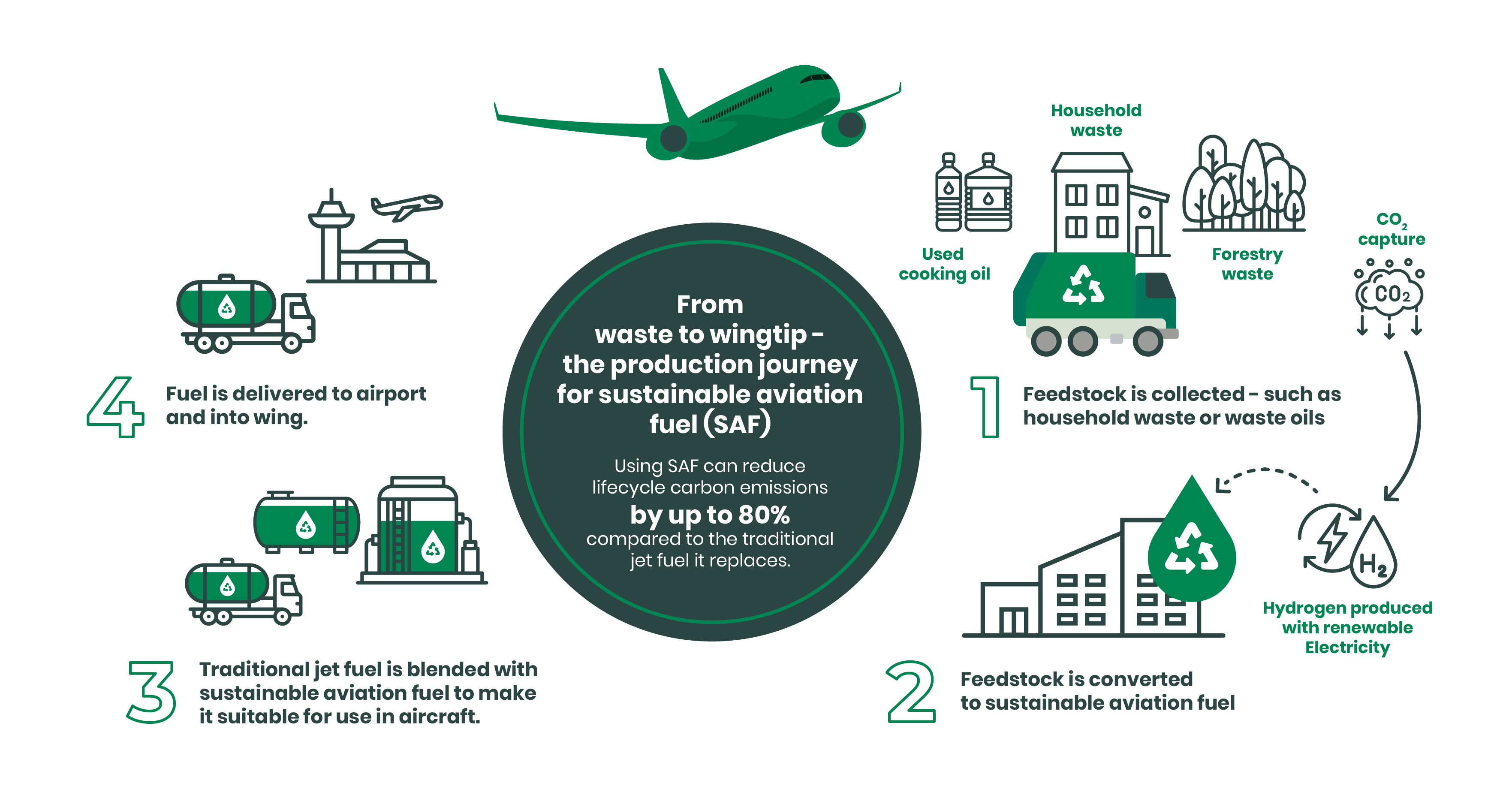What does SAF mean?
The term “SAF” is used in aviation to refer to Sustainable Aviation Fuels (SAF) with the understood notion that these are drop-in fuels that reduce greenhouse gas emissions, comply with the strict safety requirements for fuels to be used in aircraft and use feedstocks that meet recognized sustainability guidelines.
What is the difference between traditional jet fuel and SAF ?
Traditional jet fuel is made up of carbon and hydrogen molecules that are refined from fossil-carbon feedstocks (crude oil). When combusted, traditional jet fuel produces greenhouse gas emissions that add to the overall global concentration of CO2 in the atmosphere.
How is SAF produced?

In the short-to-mid-term, low-carbon-intensity SAF is being made from wastes such as used cooking oils which significantly lowers the carbon footprint of the aviation sector while making use of the current supply chain and infrastructure.
Other feedstocks such as biomass residues (forest and agriculture) can be transformed into so-called biocrudes, that can be readily upgraded to low-carbon-intensity SAF. In addition, carbon can be also captured from the air or an industrial process and using renewable energy and low carbon-intensity hydrogen can be upgraded into SAF.
What are the benefits of SAF ?
Whereas traditional jet fuel adds to overall level of CO2 by emitting carbon previously locked away, SAF reduces life cycle CO2 emissions by up to 80% and is sustainable because it does not cause negative impacts on ecosystems and enhances the sustainability of the aviation industry.
Although aviation only contributes to less than 2% of the world carbon emissions (among the lowest of the transport sectors) it will likely be the hardest sector to decarbonise with green electricity/batteries, hydrogen, etc., not easily used until sometime in the future.
Why should Canada produce SAF ?
Canada is a global supplier of sustainable, lower-cost and low carbon-intensity feedstocks that can be readily transformed to sustainable aviation fuel.
Sustainable aviation fuels remain the largest and best contributor for aviation to decarbonize and meet climate goals, as it is a short-term deployable solution, requires minimal fleet investment for airlines and makes use of existing delivery and supply chains.
Canada’s aviation sector needs SAF to remain competitive in the future. SAF is a critical strategy for industry to achieve net-zero objectives in addition to investing in new aircraft technology and alternative propulsion (electric or hydrogen solutions), continuously improving infrastructure and operations (i.e., air traffic control) and using approved offsets including carbon capture.
Are there SAF produced in Canada ?
There is currently very little SAF being manufactured in Canada. Only a handful of SAF refiners in the US, Europe and Singapore are producing or will be producing SAF in meaningful volumes.
However, Canada has the right ingredients to create an affordable and reliable SAF market through sustainable feedstock options, low-carbon energy sources and evolving climate-related policies such as clean fuel standards and carbon pricing.
Why should governments be interested by SAF?
Given the high expenditure cost of aviation fuel, federal and provincial governments must collaborate with the hard to decarbonize aviation sector to create solutions that accelerate SAF production in Canada and large-scale use to support aviation’s transition to a net-zero future.
By working with industry to establish sound policies that are stable over the long term, Canada can leverage its abundant sustainable feedstock opportunities and refining expertise to create a carbon efficient SAF market to deliver affordable SAF and put the aviation sector in Canada on a rapid pathway to decarbonize.
What is C-SAF?
Formed by industry leaders, C-SAF envisions to become the voice of SAF in Canada through the development of value chain opportunities, the design and advocacy of sound public policies and programs, and the promotion of public awareness on the sustainability benefits in decarbonizing aviation.
Become a Member
C-SAF seeks to facilitate and accelerate the commercial deployment of SAF in Canada.
The Council will establish a platform for the SAF value chain to collaborate, connect and create innovative solutions to increase the scale and use of SAF in Canada. Join us today to get in contact and collaborate with different stakeholders working together to foster innovation, production, and use of SAF in Canada and in the rest of the world.